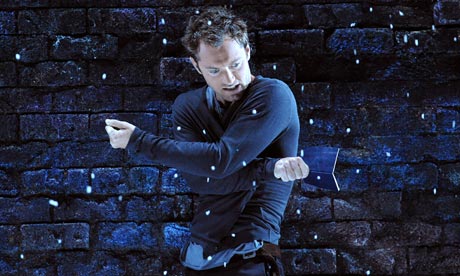
We're meant to suppose there's no such thing as traditionally staged Shakespeare, but I wonder if that's right: actors declaiming verse in an inoffensive jumble of period costumes has become the new norm. Sometimes the director settles on one epoch, as Rupert Goold did with his Stalinist Macbeth starring Patrick Stewart. Otherwise, Shakespeare is a vehicle for a designer's interpretation (see Cheek by Jowl's recent Cymbeline, draped in 1930s couture and film noir atmospherics). You can be fairly sure that Sam Mendes will unveil something similar when As You Like It and The Tempest begin their repertory run at the Brooklyn Academy of Music with a mixed English and American cast.
Still, every so often critics like to denounce director-driven Shakespeare as belittling the Bard's genius. In an interview for the online magazine Big Think last month, the Wall Street Journal's Terry Teachout groused about concept-driven Shakespeare, which he epitomised as on-stage jeeps and machine guns. Shakespeare doesn't have to be "transgressive", Teachout proclaimed. "It's actually now more common to see conceptual productions … [in] which Hamlet is played as a Nazi, or a homosexual."
Let's ignore, for the moment, how blithely Teachout glides from gays to brownshirts. There's a larger ideological agenda here: how much should the Bard reflect our times? Shakespeare wrote a great deal about war, soldiering and tyranny, not to mention gender inequality and racism. You can't avoid politics in his work – unless you try really hard. Teachout isn't bothered by modern-dress Shakespeare, per se; he just disapproves when you translate the militarism into stark modern terms. You suspect he'd be fine watching the English soak Agincourt's soil with French blood, but he'd rather you not allude to Iraq or Afghanistan.
I also wince at conceptual Shakespeare, but for another reason: most directorial concepts are far too timid. Shakespeare was a moderate, nonsectarian humanist? Nonsense. Why not assume that if the Bard were alive, he'd be a bug-eyed anarchist or an eco-terrorist (he did love nature imagery, after all). Shakespeare, that notorious mixer-up of comedy and tragedy, certainly wouldn't be churning out well-behaved divertissements for conservative critics.
And we're lying if we say we know how his plays should be staged, or that we find every single syllable equally pellucid and penetrating. It's 2010, and Shakespeare's language is a glorious, perplexing welter of ageless, soul-stirring verse, antique jokes, irrelevant cultural prejudices, blazingly vital characters and obsolescent verbiage. Translation (metaphorically speaking) and innovation are key to preserving these overdone classics.
So, no, I don't think schoolchildren should see their first Lear played by a teenage girl in a spaceship, but I'd watch it. Smuggle a perverse political agenda into that pastoral comedy. Use computer-generated performers. Cast nonactors alongside professionals. Go site-specific. Stretch the performance time over two days. Can anyone – as Harley Granville-Barker, Orson Welles and Peter Brook did – achieve a genuine breakthrough?
Jude Law's Hamlet didn't topple any paradigms, even if I enjoyed Michael Grandage's Donmar transfer on Broadway. I dubbed it "yoga Hamlet," in which our melancholy Dane squatted in chic, stretchy gray pants, limber and fit. Law handled his lines with verve and zest, but overall, this was Shakespeare as ahistorical pageant. Cultural accessory, not necessity. Would I have minded if Grandage asked Law to play the prince as a gay Nazi? Bring on the pink swastika.

